Said and Done
April 2017
Published by the Office of the Dean
MIT School of Humanities, Arts, and Social Sciences

QUOTABLE
"That MIT experience of drinking from the fire hose — it's the exact same feeling on Capitol Hill. You have to think quickly, act on limited information, and always be on the move. What happens here changes the country."
— Sam Rodarte, Jr.’13, legislative aide for Rep. Capuano
HONORS AND AWARDS
POLITICAL SCIENCE
Read and Nahmias win NSF Graduate Research Fellowships
Blair Read and Gabriel Nahmias have won 2017 National Science Foundation Graduate Research Fellowships to support their doctoral work. Only nine fellowships were awarded in political science in the whole country. Developing an NSF application is a project in the , Scope and Methods class, taught this year by Assistant Professor of Political Science Rich Nielsen.
NSF Graduate Research Fellowships
POLITICAL SCIENCE
Barry Posen receives Distinguished Scholar Award from International Studies Association
This award, from the International Security Studies section of the International Studies Association, is given for lifetime achievement in International Security Studies and presented to those who have made major contributions to scholarship in the field both via their own research and writing and their mentorship of others.
Story
ANTHROPOLOGY
Stefan Helmreich awarded the 2017 Staley Prize from the School for Advanced Research
"Often called the 'Pulitzer Prize of anthropology,' the Staley Prize is an annual $10,000 award given to a book that represents the best writing and scholarship in anthropology.” Helmreich received the honor for Alien Ocean, Anthropological Voyages in Microbial Seas (University of California Press, 2009).
Story at SAR | About Alien Ocean
FEATURE | MIT CAMPAIGN FOR A BETTER WORLD
Shaping public policy in the Nation's Capital: An enduring tradition of MIT service
People from across the Institute have made important contributions in D.C. for more than a century. Among these dedicated public servants has been a steady stream of alumni rigorously trained in MIT's SHASS fields, including economics, political science, languages, security studies, and international relations. Meet MIT alums, Samuel Rodarte Jr. '13 and Kathleen Hicks PhD '10.
Story
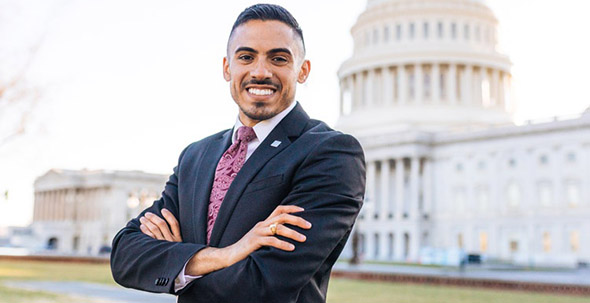
Samuel Rodarte, Jr. '13, legislative aide for Rep. Michael Capuano
RESEARCH
ECONOMICS
America’s two-track economy | Peter Temin
In The Vanishing Middle Class: Prejudice and Power in a Dual Economy, MIT economist Peter Temin finds multiple reasons for the decline in middle-class earning power. Among these are the decline of unions, the reduced bargaining power of middle class workers, racial inequality and incarceration, and the need for more investment in education.
Story by Peter Dizikes at MIT News
J-PAL NORTH AMERICA
Cheaper, faster randomized evaluations
J-PAL North America releases new catalog of administrative data sets to give researchers a leg up in conducting rigorous evaluations of social programs.
Story
GLOBAL RESEARCH
Mapping MIT's humanities, arts, and social science research around the globe
Each point on the map represents one or more projects selected from the School's larger international portfolio. Together, the projects span the breadth of MIT-SHASS disciplines — from anthropologists researching post-Soviet Mongolia to political scientists studying health services in Guatemala, to linguists revolutionizing STEM education in Haiti.
Browse the map
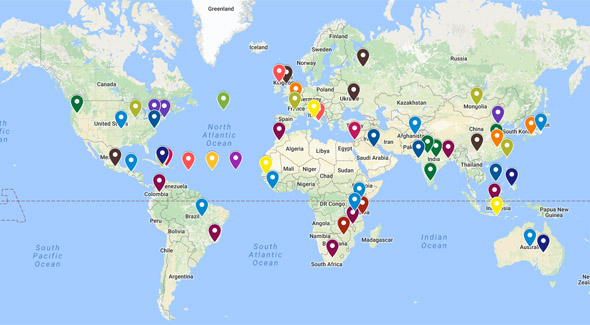
CENTER FOR INTERNATIONAL STUDES + CSAIL
MIT experts urge Trump administration to take immediate action on cybersecurity
Report warns of hacking risk to electric grid, oil pipelines, and other critical infrastructure.
Story at MIT News
SECURITY STUDIES
Q&A: Meet MIT's experts in Asian security
Influential team counsels leaders, educates students, and informs policy.
Interview by SHASS Communications
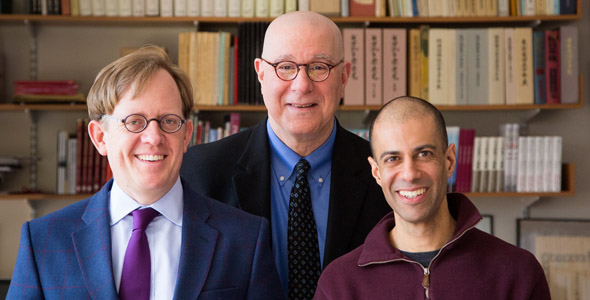
L to R: M. Taylor Fravel, Associate Professor of Political Science; Richard Samuels, Ford International Professor of Political Science and Director of the Center for International Studies; Vipin Narang, Mitsui Career Development Associate Professor of Political Science
MIT's Asian Security Studies faculty train the next generation of scholars and security policy analysts; counsel national security officials in the U.S. and abroad; and inform policy through publications and frequent contributions to public debates.
NEWS
POLITICAL SCIENCE
3 Questions: Lourdes Melgar on Mexico’s energy reform
Robert Wilhelm Fellow, MIT alum and former Mexican government official, discusses the opportunities and challenges of recent energy reforms in Mexico.
Interview by MITEI
COMPARATIVE MEDIA STUDIES | OPEN DOC LAB
VR through a long lens: Deniz Tortum lends historical perspective to a new medium
Tortum, a researcher at the MIT Open Documentary Lab, speaks about his research as well as several of his virtual reality and documentary film projects.
Interview by Sharon Lacey
MENS ET MANUS AMERICA INITIATIVE
At MIT, Arlie Hochschild discusses U.S. political divisions and finding common ground
This Mens et Manus America event centered on Hochschild's most recent book, Strangers in Their Own Land: Anger and Mourning on the American Right (The New Press, 2016). Hochshild shared insights from five years of research and conversations with conservative citizens in Louisiana, and suggested three pillars of action for finding more common ground among U.S. voters.
Story by MIT SHASS Communications | Video of Hochschild's talk: Strangers in Their Own Land
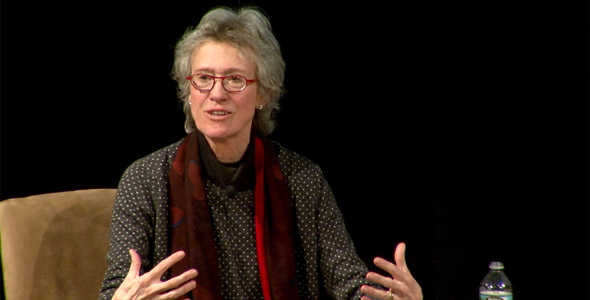
Hochschild said she sees the opportunity for "three pillars of activism." The first action, she said, is to defend core American values such as "the very principle of checks and balances [and] the independence of the press and a powerful judiciary." A patriotic embrace of the principles of democracy "is a dead center issue," she said.
POLITICAL SCIENCE
Senator Bernie Sanders visits MIT
In a March 31 talk at MIT, U.S. Senator Bernie Sanders (I-VT), discussed his experiences as a presidential candidate and his thoughts about the political process. To surmount the country's current economic and social issues, Sanders advocated that the U.S. implement such measures as affordable college education, a single-payer health care system, and the removal of large money donations from politics.
Story by Peter Dizikes at MIT News | Boston Review Q&A with Sanders
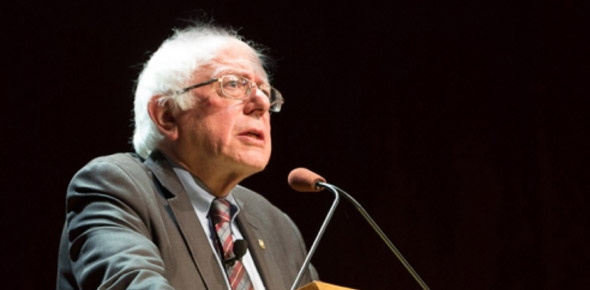
Photograph by Carlos Silva, MIT News
“There is a lot of beauty in this country, a lot of extraordinary people who want this country to be what it can be,” Sanders said. “I can’t tell any one person what to do. But I will say this: Despair is not an option.”
STUDENTS AND ALUMNI
HASTS PhD PROGRAM
PhD Student vs. PhD Candidate | Blog Post by Alison L.
“I’m a historian (see my earlier post about being a humanist at MIT), so my path to candidacy differs a bit from other doctoral tracks at MIT. But whatever the discipline, the transition from student to candidate is an arduous process.”
Commentary at the MIT Graduate Blogs
INTERNATIONAL STUDENTS
Video: I grew up in Damascus
Motivated by an ethos of service, Ihssan Tinawi is making a positive mark on the world. Tinawi, who is majoring in engineering and economics, cites his MIT experiences, a history class in particular, as inspiration.
Watch video
POLITICAL SCIENCE
Strength in numbers | Dean Knox
Political Science PhD candidate Dean Knox studies social networks and the way individuals use them to access government goods and services.
Story by Sarah Baldwin
POLITICAL SCIENCE
Grounded in geology
Political Science PhD student Renato Lima de Oliveira examines how a country's natural resources affect its politics and policies.
Story on MIT News
FORTHCOMING EVENTS
SHASS INFINITE MILE AWARDS 2017
Awards Ceremony and Luncheon, Monday, May 1, 12pm
All members of the SHASS community are invited to attend our annual gathering to sing the praises of exceptional members of the School staff. See you there!
RSVP for the event
WRITING FOR A WIDER AUDIENCE
Panel, Q&A, and Catered Reception | Tuesday, April 25, 5:30-7:30pm, Bush Room
This event is an opportunity for 50 MIT faculty members to attend a panel and Q&A session with six distinguished publishing experts — focusing on the subject of turning scholarship into general literature. A reception afterwards will allow more time for faculty to talk informally with the panelists.
Seating for the event is limited to 50.
Learn more, see panelists' bios, and RSVP to reserve a seat.
IN THE MEDIA
HISTORY
At a hefty cost, World War I made the U.S. a major military power
MIT historian Christopher Capozzola explains that World War I, while less well-remembered in the U.S., “touched nearly every aspect of American life, public and private, and every community in the country.” Capozzola has served as a leading scholar for the new PBS series, "The Great War," produced by The American Experience.
Story at NPR | The Great War, PBS film series from The American Experience
MUSIC
The State Of Jazz In Boston Today | Mark Harvey
MIT’s Mark Harvey — musician, composer, and music director of the Aardvark Jazz Orchestra — talks to WBUR's "All Things Considered" about how the Boston jazz scene has evolved.
Story at WBUR | Audio: No Walls by Mark Harvey
J-PAL GLOBAL
Win $1 million for your bright idea to fix the world | Abiijit Benerjee
"The U.N. is a particularly good example of brokenness,” says Abiijit Banerjee, Professor of Economics, discussing the “New Shape” competition, which offers a million-dollar prize for proposals to fix the world’s most pressing problems.
Story at NPR
ECONOMICS AND ROBOTICS
The robot debate is over: the jobs aren't coming back | David Autor
The Guardian explores the impact of automation on U.S. employment, citing MIT economist David Autor as “the most influential proponent” of the argument that new technology ultimately creates as many jobs as it destroys.
Story at The Guardian
ECONOMICS
Are we prepared for the robot apocalypse? | Daron Acemoglu
The Washington Post reports on new research co-authored by MIT economist Daron Acemoglu, which finds that industrial robots eliminated up to 670 thousand American jobs between 1990 and 2007.
Story at The Washington Post
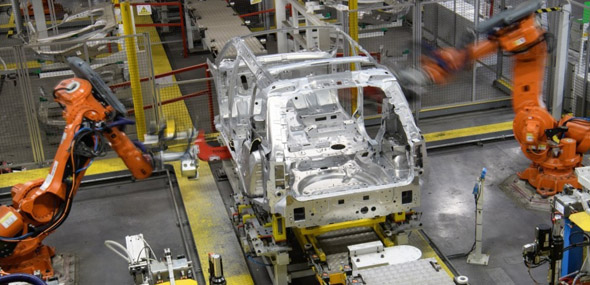
Robotic systems work on a car, Jaguar Land Rover factory, Solihull, England. Photo: Leon Neal, Washington Post
ECONOMICS
How many robots does it take to replace a human job? | Daron Acemoglu
The Atlantic reports on a new study co-authored by Daron Acemoglu, Elizabeth and James Killian Professor of Economics at MIT, which finds that each new robot replaces three human workers.
Story at The Atlantic
ECONOMICS
Evidence that robots are winning the race for American jobs | Daron Acemoglu
Journalist Claire Cain Miller calls a new publication co-authored by MIT economist Daron Acemoglu “the first study to quantify large, direct, negative effects of robots.”
Story at The New York Times
ECONOMICS + POLITICAL ANALYSIS
Places with more job loss to robots less likely to support Clinton | Daron Acemoglu
Political analyst Philip Bump uses a recent study co-authored by MIT economist Daron Acemoglu to make the case that areas whose employment rates were negatively affected by automation were also more likely to vote for Trump.
Story at The Washington Post
No opioids please: Clearing the way to refuse prescription | Seth Mnookin
Assistant professor of science writing, Seth Mnookin wrote about taking opioid pain medication for kidney stones. "Having a no-opioids directive in that case probably would have created a whole bunch of problems," says Mnookin, describing that pain as a feeling of "being hacked at with a phalanx of rusty chisels."
AP Story
HEALTH ECONOMICS
Republicans plan to change how the poor get health insurance | Jonathan Gruber
"I just don't understand where they think this magical savings is going to come from," said Gruber. "You are going to fundamentally put at risk the health of the low-income population."
Story at The Washington Post
HEALTH ECONOMICS
Analysis: will repealing the ACA really kill 60,000? | Amy Finkelstein
A study by MIT economist Amy Finkelstein bolsters the argument that having health insurance improves health.
Story at The Washington Post
Battle to repeal and replace the ACA | Jonathan Gruber
MIT economics professor Jonathan Gruber is a guest on CNN discussing the new proposed health care plan. "There's nothing in the proposal that gives Americans more choice. This is simply taking away choice from the poorest, the sickest, and the oldest Americans who would pay five times more what they're paying today."
Story at CNN
HEALTH ECONOMICS
Should the U.S. government buy a drug company to save money? | Sara Fisher Ellison
From a public health perspective, buying Gilead isn't a bad idea, says Sara Fisher Ellison, an economics lecturer at MIT. "The reason this proposal could work is that right now the drugs are only serving a fraction of the potential patients," she says, "and there's a big public health benefit to serving all of the patents."
Story at NPR
PROGRAM IN SCIENCE, TECHNOLOGY, AND SOCIETY
Smart phones are strongly addictive | Sherry Turkle
MIT Professor Sherry Turkle, who has studied the effects of technology on users for decades, weighs in on the smartphone debate, bringing her recent findings that smartphones have been an obstacle to people feeling at ease on their own.
Story at The Economist
POLITICAL SCIENCE
India, long at odds with Pakistan, may be rethinking nuclear first strikes | Viping Narang
“It’s very scary because all the ‘first-strike instability’ stuff is real,” says MIT political scientist Viping Narang. The perceived advantage of a nuclear first strike on the part of rival nations may make nuclear war more likely to occur.
Story at The News York Times | Story at The Wall Street Journal
POLITICAL SCIENCE
Is it time to talk with North Korea? | Jim Walsh
"Trump, simply by virtue of being the new president, has another option. He can talk to the North Koreans and negotiate. North Korean officials have said that they are willing to turn the page and start fresh with President Trump. If he is open, they would be open. Or so they say."
Commentary at Fox News
CENTER FOR INTERNATIONAL STUDIES
Why U.S. antimissile system in South Korea worries China | M. Taylor Fravel
"China is probably confident in its ability to be able to retaliate, but given the size and sophistication of U.S. nuclear forces and the steady development of ballistic missile defenses, coupled with China's small nuclear arsenal, the margin for error is thin," said Fravel.
Story at The New York Times
CENTER FOR INTERNATIONAL STUDIES
U.S.-Japan relationship: past, present, and future | Richard Samuels
Looking back, from a 2017 perch when Tokyo is a leading champion of free trade and Washington is tearing up multilateral trade agreements — it is clear that Japan, the United States, and the bilateral relationship all have changed dramatically — and in unexpected ways," said Richard Samuels.
Story at CSIS
LINGUISTICS
How discrimination nearly stalled a dual-language program in Boston | Michel DeGraff
Michel DeGraff, MIT linguist and head of the MIT-Haiti project, reflects on the relationship between social class and the French language in Haitian society, on the occasion of the launching, in Fall 2017, of Boston Public Schools' first English/Kreyòl Dual Language program. “We became free in 1804 but through the French language we did remain colonized,” DeGraff said.
Story at The Atlantic
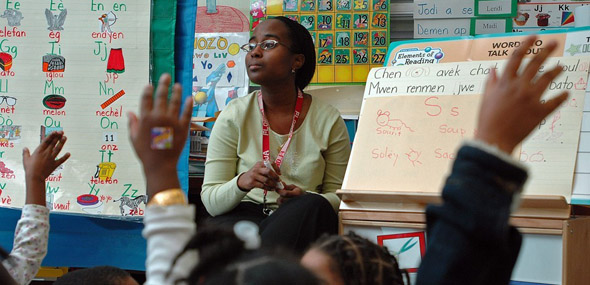
A teacher in Miami gives a lesson in Creole. Boston's first Haitian Creole–English dual-language school opens this year. Story at The Atlantic, Photo: David Adame, AP
CENTER FOR INTERNATIONAL STUDIES
Former NSA inspector general releases cybersecurity recommendations | Brenner
Joel Brenner, former inspector general of the National Security Agency and head of U.S. Counterintelligence in the Office of the Director of National Intelligence, and currently a senior research fellow at the MIT Center for International Studies, talks about a recently-published a set of eight key cybersecurity recommendations.
Story at WBUR | Related story at Forbes
POLITICAL SCIENCE
“Alternative facts” and “alternative language”
Story quotes political science professor Adam Berinsky who points to the shifting use of the term “fake news” — to mean any news one does not like — as one example of a rhetorical strategy to shape public perception.
Story at NPR
POLITICAL SCIENCE
Why objectively false things continue to be believed | Adam Berinsky
Professor of political science, Adam Berinsky recently found that some ways of correcting false information are more effective than others. For instance citing a Republican congress member effectively refuted the mistaken belief that “death panels” were part of the Affordable Care Act.
Story at The New York Times | Related story at The Washington Post
STAY IN TOUCH
Follow us
SHASS stories on MIT News
Bookmark this page
Publications Directory
Portal to all MIT SHASS publications
MIT Campaign for a Better World
Story | Join Us
Said and Done is published by the Office of the Dean
MIT School of Humanities, Arts, and Social Sciences
Editor and Designer: Emily Hiestand, Director, SHASS Communications
Publication Associate: Daniel Pritchard, SHASS Communications
April 13, 2017
About the MIT School of Humanities, Arts, and Social Sciences
Making a better world — Generating solutions for the great challenges of our age requires both advanced technical and scientific knowledge and a deep understanding of the world's human complexities. MIT-SHASS researches and advances the cultural, political, and economic dimensions of innovation — the broad range of human realities, from deeply-felt cultural traditions to building codes to political tensions, in which science and technology issues are embedded.
Excellence — In 2015, MIT's Social Science disciplines were ranked first in the world, and MIT's Humanities and Arts disciplines were ranked among the top three worldwide.
Research with a global impact — The MIT-SHASS research portfolio is vast, including anthropology, comparative media studies, economics, history, international studies, languages, linguistics, literature, music and theater arts, political science, philosophy, security studies, and writing, including science writing.
Education that empowers — The School teaches every MIT undergraduate, empowering students with cultural and historical perspectives, and critical thinking and communication skills — to help them serve the world wisely and well. The School's seven graduate programs are all recognized as among the finest in the world.
Cultivating leaders — SHASS has a central role in international education at MIT, and in preparing students for leadership at home and on international teams. Through all their SHASS coursework, and in MISTI, the School's pioneering applied international education program, MIT students learn how to work, collaborate, and thrive in cultures around the globe.



